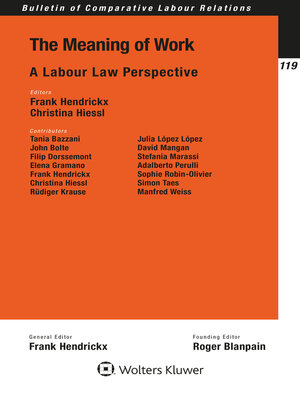The Meaning of Work
ebook ∣ A Labour Law Perspective · BULLETIN OF COMPARATIVE LABOUR RELATIONS
By Christina Hiessl

Sign up to save your library
With an OverDrive account, you can save your favorite libraries for at-a-glance information about availability. Find out more about OverDrive accounts.
Find this title in Libby, the library reading app by OverDrive.



Search for a digital library with this title
Title found at these libraries:
| Library Name | Distance |
|---|---|
| Loading... |
Bulletin of Comparative Labour Relations
Now that the idea of the workplace and the traditional view of working time are undergoing major challenges, it is important to rethink the questions of what is work and what is the meaning of work. This book delves into the problems and issues raised by these questions today and explores new pathways and answers. Fourteen distinguished labour and employment law experts contribute insightful examinations of developments and trends in the world of work that have a penetrating impact on the ways in which we understand and approach labour law.
The book is the result of the Third Conference in Commemoration of Professor Roger Blanpain, organized by the Institute for Labour Law of KU Leuven in September 2023. In a collection of papers, the contributors explore such aspects of the rapidly changing work landscape as the following:
working with smart technology and artificial intelligence;
protection of the self-employed and teleworkers;
the erosion of boundaries between work and personal life;
the 'right to disconnect';
protection of worker privacy in an era of heightened surveillance;
reconciling the EU General Data Protection Regulation (GDPR) with labour law requirements;
labour law protections beyond the human worker to include the environment;
work in periods of crisis;
precarious work;
wearable technology in workplace monitoring; and
robots in the workplace.
With a core consideration of the relationship between labour law and the individual, the overall perspective proposes a transformative vision where labour law becomes the law of social freedom, intrinsically linked to personal development and social recognition.
The diverse contributions together provide a crucial foundation for reimagining labour law and advancing our understanding of the evolving meaning of work by highlighting the necessity for legal frameworks to respond to unprecedented global, technological, and social transformations. With its practical insights into contemporary workplace issues, critical analysis of work-life balance, and guidance on managing technological change, it will be welcomed by practitioners, academics, regulators, and social partners working in the fields of labour and employment law.







